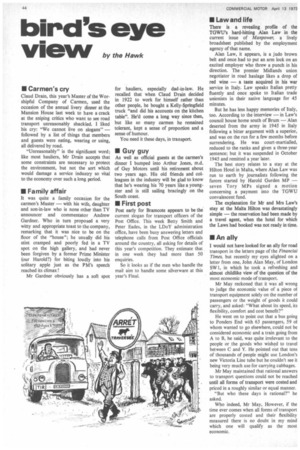bird's eye
Page 46

If you've noticed an error in this article please click here to report it so we can fix it.
view by the Hawk
• Carmen's cry
Claud Drain, this year's Master of the Worshipful Company of Carmen, used the occasion of the annual livery dinner at the Mansion House last week to have a crack at the sniping critics who want to see road transport unreasonably shackled. I liked his cry: "We cannot live on slogans" — followed by a list of things that members and guests were eating, wearing or using, all delivered by road.
"Unreasonably" is the significant word; like most hauliers, Mr Drain accepts that some constraints are necessary to protect the environment, but not the sort which would damage a service industry so vital to the economy over such a long period.
• Family affair
It was quite a family occasion for the carmen's Master — with his wife, daughter and son-in-law who is none other than TV announcer and commentator Andrew Gardner. Who in turn proposed a very witty and appropriate toast to the company, remarking that it was nice to be on the floor of the "house"; he usually did his stint cramped and poorly fed in a TV spot on the high gallery, and had never been forgiven by a former Prime Minister (our Harold?) for biting loudly into his solitary apple just as the PM's speech reached its climax Mr Gardner obviously has a soft spot for hauliers, especially dad-in-law. He recalled that when Claud Drain decided in 1922 to work for himself rather than other people, he bought a Kelly-Springfield truck "and did his accounts on the kitchen table". He'd come a long way since then, but like so many carmen he remained tolerant, kept a sense of proportion and a sense of humour.
You need it these days, in transport.
• Guy guy
As well as official guests at the carmen's dinner I bumped into Arthur Jones, m.d. of Guy Motors until his retirement about two years ago. His old friends and colleagues in the industry will be glad to know that he's wearing his 70 years like a youngster and is still sailing bracingly on the South coast.
• First post
Post early for Bramcote appears to be the current slogan for transport officers of the Post Office. This week Betty Smith and Peter Eades, in the LDoY administration office, have been busy answering letters and telephone calls from Post Office officials around the country, all asking for details of this year's competition. They estimate that in one week they had more than 50 enquiries.
So it looks as if the men who handle the mail aim to handle some silverware at this year's Final.
• Law and life
There is a revealing profile of the TGWU's hard-hitting Alan Law in the current issue of Manpower, a lively broadsheet published by the employment agency of that name.
Alan Law, it appears, is a judo brown belt and once had to put an arm lock on an excited employer who threw a punch in his direction. The premier Midlands union negotiator in road haulage likes a drop of red wine — a taste acquired in his war service in Italy. Law speaks Italian pretty fluently and once spoke to Italian trade unionists in their native language for 45 minutes.
But he has less happy memories of Italy, too. According to the interview — in Law's council house home south of Brum — Alan deserted from the army in 1945 in Italy following a bitter argument with a superior, and was on the run for a few months before surrendering. He was court-martialled, reduced to the ranks and given a three-year sentence; but it was suspended in October 1945 and remitted a year later.
The best story relates to a stay at the Hilton Hotel in Malta, where Alan Law was run to earth by journalists following the furore started by Harold Gurden MP — seven Tory MPs signed a motion concerning a payment into the TGWU convalescent fund.
The explanation for Mr and Mrs Law's stay at the Malta Hilton was devastatingly simple — the reservation had been made by a travel agent, when the hotel for which the Laws had booked was not ready in time.
• An ally
I would not have looked for an ally for road transport in the letters page of the Financial Times, but recently my eyes alighted on a letter from one, John Alan May, of London SW1, in which he took a 'refreshing and almost childlike view of the question of the most economic mode of transport.
Mr May reckoned that it was all wrong to judge the economic value of a piece of transport equipment solely on the number of passengers or the weight of goods it could carry, and asked: "What about its speed, its flexibility, comfort and cost benefit?"
He went on to point out that a bus going to Ponders End with 63 passengers, 59 of whom wanted to go elsewhere, could not be considered economic and a train going from A to B, he said, was quite irrelevant to the people or the goods who wished to travel between C and Y. He pointed out that tens of thousands of people might use London's new Victoria Line tube but he couldn't see it being very much use for carrying cabbages.
Mr May maintained that rational answers to transport questions could not be reached until all forms of transport were costed and priced in a roughly similar or equal manner.
"But who these days is rational?" he asked.
Who indeed, Mr May, However, if the time ever comes when all forms of transport are properly costed and their flexibility measured there is no doubt in my mind which one will qualify as the most economic.
























































































































